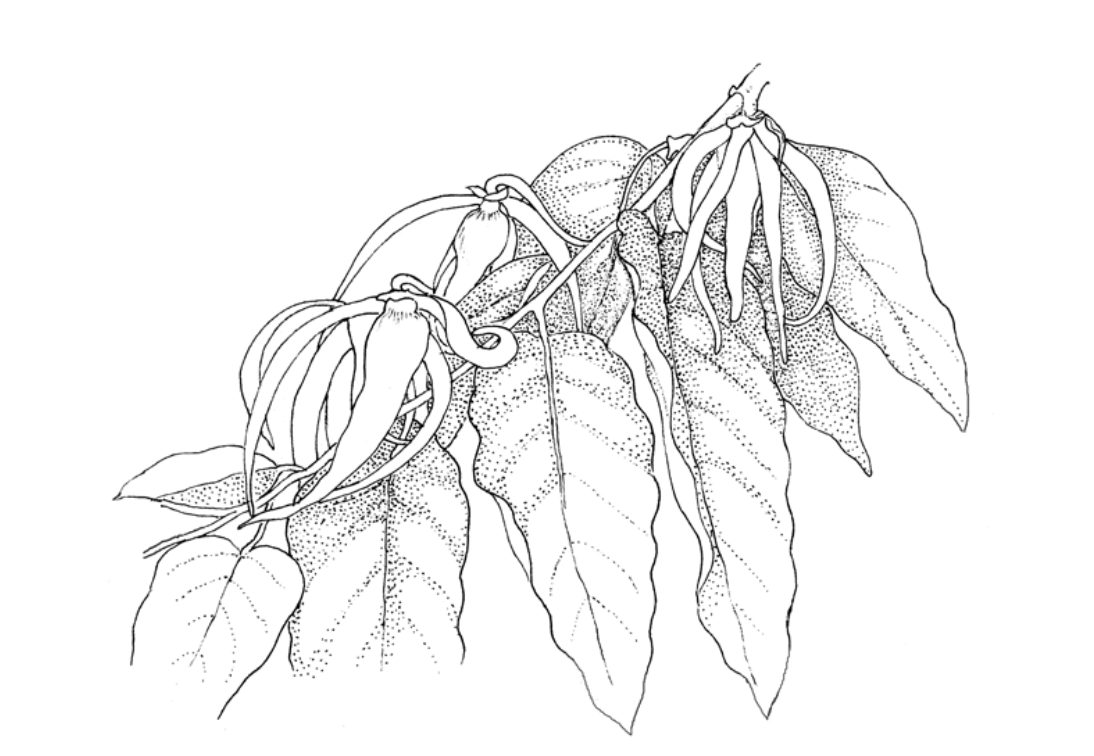Posted by Peter Holmes, LAc, MH on Jan 15th 2022
Ylang Ylang Essential Oil: The ‘Flower of Flowers’
Ylang Ylang Essential Oil
The tropical ylang-ylang tree in the soursop family acquired its name from the Filipino Ilang-ilang in its country of origin. The name refers to the wind-borne fluttering of its slim viridian-yellow flowers, although the literal translation would be ‘flower of flowers’. You may know the name best from the popular Ylang Ylang Essential Oil that the flower produces. In the islands where the flowers are cultivated, amidst the cerulean waters of the South Indian Ocean, one is spellbound as cool sea breezes waft and mingle with the warm, humid tropical air of the land. The bracing scent of ocean brine intertwines with the light, lilting fragrance of ylang ylang flowers, both swaying lazily in the clear sky in a gentle haze of euphoria.
Although a fairly recent addition to the aromatic palette of essential oil therapy, the flowers have been used for centuries throughout the many islands of the Philippines, Indonesia and the Indian Ocean for skin and hair care, for medicine and as offerings to the gods. They are traditionally infused in coconut oil in much in the same way as the Tahitian gardenia flowers are infused to make Monoi Tiare Tahiti oil. Ylang-ylang flowers have always symbolized love and well-balanced emotions.

Ylang Ylang Essential Oil in Europe
In the early years of the Victorian era, the 1830s, an infused oil of these flowers in coconut or palm oil was imported to England from Indonesia and sold as Macassar Oil after the town of Makassar on Sulawesi Island. It was successfully promoted for grooming and styling hair and became highly popular with the gentlemen in particular – so popular, in fact, that an antimacassar doily had to be developed to protect the back of upholstered chairs from the trail of unsightly oil stains that it left behind. It is reasonable to suppose, however, that this Ylang ylang flower infusion also enjoyed such approbium as much because of its sensuous, perfumy aroma as because of any hair conditioning properties it may have possessed. We can only imagine the effect that this heady, voluptuous fragrance, redolent of refined sensuality, wafting freely through Victorian drawing rooms, must have had on prudish, straight-laced Victorian society of the day.
It is no surprise, then, that French perfumers soon eagerly sought to incorporate Ylang ylang essential oil into their natural perfumes. Presented publicly for the first time at the Paris World Exhibition of 1878, this exquisite fragrance upstaged all other colonial essential oils and soontook the world of perfumery by storm. By the turn of the century,Ylang ylang essential oil had no rival as a floral heart note except for Oil of Neroli itself. The blessedtree was now under well-pruned cultivation in many French-held Mascarene islands of the Indian Ocean, notably in La Réunion and Nosy Bé.
Beneficial Properties of Ylang Ylang Essential Oil
Today, the essential oil of the ylang ylang tree is popularly renowned for its aphrodisiac qualities. However, it is now known to exert specific beneficial actions, when used by deep inhalation or internally, that go far beyond this general effect. The beneficial properties of Ylang ylang essential oil were originally explored and reported by the French chemists Garnier and Rechler on Réunion island in the early 1900s. These hinge around a twin relaxing and regulating action that is systemic and profound in effect. Targeting the entire nervous, circulatory and muscular system, the oil may have a very relaxing effect for helping with tense conditions such as nervous tension, anxiety, spasms and pain. In Chinese medicine terms, these would be conditions of constrained Qi. While calming brain functions and enhancing parasympathetic activity, the remedy relaxes both smooth and striated muscles equally.
When this aromatic remedy is inhaled, it may have a beneficial effect on the limbic system. As this corresponds to a potentially physiological relaxant effect, on the psychological level Ylang ylang will address those issues of insecurity, guilt and anxiety that lead to loss of libido. The net result can indeed be aphrodisiac, but not necessarily in those with chronic buttoned-up emotions and unresolved distressed feelings.
Along with this effect, Ylang ylang may induce a state of euphoria and optimism combined that is virtually unique. In distinction to its perfume and recreational uses therefore, its clinical applications are general any intense negative feelings, including anger, hatred, deep despair and self-destructiveness. Ultimately, this oil may exert a good stabilizing effect on moods and emotions, especially for distressed feelings in general. It is particularly useful for those with emotional instability and chronic unresolved anger.
In dealing deftly with intense emotions, Ylang ylang bestows a relaxing, softening, harmonizing and lightening grace over the energetic Heart – a function that is expressed in Chinese medicine as ‘nourishing Heart Blood.’ Its ability to transform dark negativity into lightness and positivity is perhaps unique. In opening us to the lightness of being, Ylang ylang is clearly a remedy for the soul as much as for the body.
FDA Compliance: The information on this website has not been evaluated by the Food & Drug Administration or any other medical body. We do not aim to diagnose, treat, cure or prevent any illness or disease. Information we share is for educational purposes only. You must consult your doctor (or other qualified health professional) before acting on any content on this website, especially if you are pregnant, nursing, taking medication or have a medical condition.
